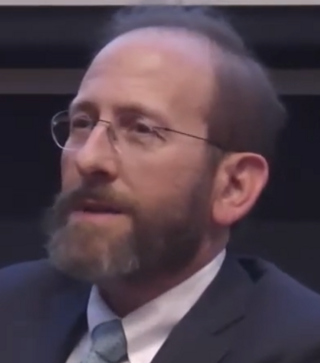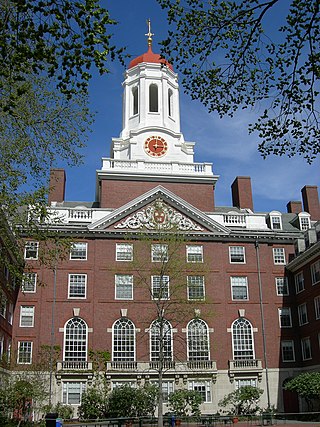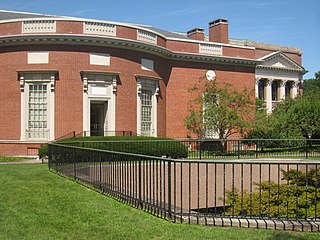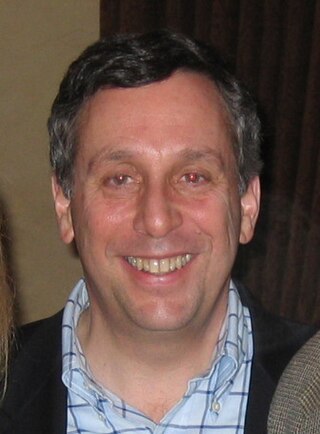
John Harvard (1607–1638) was an English dissenting minister in colonial New England whose deathbed bequest to the "schoale or colledge" founded two years earlier by the Massachusetts Bay Colony was so gratefully received that it was consequently ordered "that the Colledge agreed upon formerly to be built at Cambridge shalbee called Harvard Colledge." John Harvard was born in Southwark, England. A graduate of Emmanuel College of the University of Cambridge, he emigrated to New England in 1637. Harvard University considers him the most honored of its founders—those whose efforts and contributions in its early days "ensure[d] its permanence"—and a statue in his honor is a prominent feature of Harvard Yard.

The Harvard Crimson is the student newspaper of Harvard University and was founded in 1873. Run entirely by Harvard College undergraduates, it served for many years as the only daily newspaper in Cambridge, Massachusetts.
Henry Dunster was an Anglo-American Puritan clergyman and the first president of Harvard College. Brackney says Dunster was "an important precursor" of the Baptist denomination in America, especially regarding infant baptism, soul freedom, religious liberty, congregational governance, and a radical biblicism.

The president of Harvard University is the chief administrator of Harvard University and the ex officio president of the Harvard Corporation. Each is appointed by and is responsible to the other members of that body, who delegate to the president the day-to-day running of the university.
The Harvard Board of Overseers is an advisory board of alumni at Harvard University. Unlike the Harvard Corporation, the Board of Overseers is not a fiduciary governing board, but instead "has the power of consent to certain actions of the Corporation." Formed in 1642, the Board of Overseers predates the Corporation's 1650 incorporation.

Dunster House is one of twelve undergraduate residential houses at Harvard University. Built in 1930, it is one of the first two dormitories at Harvard University constructed under President Abbott Lawrence Lowell's House Plan and one of the seven Houses given to Harvard by Edward Harkness. In the early days, room rents varied based on the floor and the size of the room. Dunster was unique among Harvard dormitories for its sixth-story walk-up ; these rooms were originally rented by poorer students, such as Norman Mailer.

The Harvard Faculty of Arts and Sciences (FAS) is the largest of the ten faculties that constitute Harvard University.

Lawrence Seldon Bacow is an American economist and retired university administrator. Bacow served as the 12th president of Tufts University from 2001 to 2011 and as the 29th president of Harvard University from 2018 to 2023. Before that, he was the Hauser leader-in-residence at the Center for Public Leadership at Harvard Kennedy School.
Harvard College has several types of social clubs. These are split between gender-inclusive clubs recognized by the college, and unrecognized single-gender clubs which were subject to College sanctions in the past. The Hasty Pudding Club holds claim as the oldest collegiate social club in America, tracing its roots back to 1770. The next oldest institutions, dating to 1791, are the traditionally all-male final clubs. Fraternities were prominent in the late 19th century as well, until their initial expulsions and then eventual resurrection off Harvard's campus in the 1990s. From 1991 onwards, all-female final clubs as well as sororities began to appear. Between 1984 and 2018, no social organizations were recognized by the school due to the clubs' refusal to become gender-inclusive.
Paul James Finnegan is a Chicago-based investor and philanthropist. In 1992, he co-founded Madison Dearborn Partners and currently serves as the firm's co-CEO. From 2014 to 2023, served as the Treasurer of the Harvard Corporation and the Chair of the Harvard Management Company.
The Trustees of Princeton University is a 40-member board responsible for managing Princeton University's $37.6 Billion endowment (2021), real estate, instructional programs, and admission. The Trustees include at least 13 members elected by alumni classes, and the Governor of New Jersey and the President of the university as ex officio members.
William F. Lee is an American intellectual property and commercial litigation trial attorney. As co-managing partner of WilmerHale, Lee was the first Asian-American to lead a major American law firm. He is also a Senior Fellow of the Harvard Corporation, the governing board of Harvard University.

Harvard University is a private Ivy League research university in Cambridge, Massachusetts. Founded in 1636 as Harvard College and named for its first benefactor, Puritan clergyman John Harvard, it is the oldest institution of higher learning in the United States. Its influence, wealth, and rankings have made it one of the most prestigious universities in the world.

Quincy House is one of twelve undergraduate residential Houses at Harvard University, located on Plympton Street between Harvard Yard and the Charles River. The second largest of the twelve undergraduate houses, Quincy House was named after Josiah Quincy III (1772–1864), president of Harvard from 1829 to 1845. Quincy House's official counterpart at Yale University is Branford College.

Derek Jonathan Penslar, is an American-Canadian comparative historian with interests in the relationship between modern Israel and diaspora Jewish societies, global nationalist movements, European colonialism, and post-colonial states.

John Harvard is a sculpture in bronze by Daniel Chester French in Harvard Yard, Cambridge, Massachusetts, honoring clergyman John Harvard (1607–1638), whose deathbed bequest to the "schoale or Colledge" recently undertaken by the Massachusetts Bay Colony was so gratefully received that it was consequently ordered "that the Colledge agreed upon formerly to bee built at Cambridg shalbee called Harvard Colledge." There being nothing to indicate what John Harvard had looked like, French used a Harvard student collaterally descended from an early Harvard president as inspiration.

Alan Michael Garber is an American physician, health economist, and academic administrator. He is currently Harvard University's interim president. He served as Provost of Harvard from 2011 until March 14, 2024, when John F. Manning took on the position on an interim basis.

Students for Justice in Palestine is a pro-Palestinian college student activism organization in the United States, Canada and New Zealand. It has campaigned for boycott and divestment against corporations that deal with Israel and organized events about Israel's human rights violations. In 2011, The New York Times reported that "S.J.P., founded in 2001 at the University of California, Berkeley, has become the leading pro-Palestinian voice on campus."

Claudine Gay is an American political scientist and academic administrator who is the Wilbur A. Cowett Professor of Government and of African and African-American Studies at Harvard. Gay's research addresses American political behavior, including voter turnout and politics of race and identity.













